What to expect from four-year-olds and fun, easy play ideas. Full of energy. Silly. Pretenders. These are all good ways to describe four-year-olds. They are imaginative. They have discovered humor and enjoy telling “jokes.” They love to talk and ask questions. Four-year-olds are building self-confidence and like trying new things. They may overestimate their abilities and “leap before they look.”

What to expect from four-year-olds
Remember: Every child is different. They may learn and grow at different rates.
Four-Year-Olds love to talk and say silly things.
Doing skills
- Can dress herself without a lot of help
- Uses a spoon, fork, and dinner knife at the table
- Uses the toilet alone
- Brushes her teeth, combs hair, hangs up clothes without a lot of help
- Can hop on one foot
- Runs, jumps, hops, and skips
- Can stack ten or more blocks
- Throws a ball easily
- Likes to gallop, turn somersaults, and climb
- Can place objects in a line from largest to smallest
- May be able to print his own name
Thinking skills
- Can read some familiar words in simple books or on signs -- STOP sign, McDonalds
- Works at one activity for ten to fifteen minutes
- Understands the ideas of tallest, biggest, more, on, in, over, under
- Can pick out colors -- red, yellow, blue
- Can sort by shapes and colors
- Can count seven things
- Can follow directions
- Has some trouble telling what's real and what's pretend
- Can learn his name, address, and phone number
Talking skills
- Asks a lot of questions -- who, what, when, where, and why
- Likes to talk and have conversations
- Likes to sing simple songs
- Likes rhymes and silly words
- May shock others by using "bad" words
Skills with others
- Enjoys playing with other children
- Takes turns and shares (most of the time)
- Understands and follows simple rules
- Likes to play pretend
- May have pretend friends
- Changes the rules of games as he goes along
Tips for working With four-year-olds
 Remember that they may still confuse reality and fantasy, so expect some wild stories and exaggerations.
Remember that they may still confuse reality and fantasy, so expect some wild stories and exaggerations.- Continue to supervise them closely as they can not estimate their abilities and could try some risky tricks.
- They have a strong need to feel important and appreciated. Notice accomplishments.
- Set up opportunities for children to do routine activities independently and make choices.
- Encourage physical development by including gross motor activities daily in your plans. Add activities that challenge children to use new skills (jumping over an obstacle) and to develop motor control and balance (walking on a balance beam).
- Introduce special concepts by talking about position (i.e. over/under, on/off, in/out, before/after)
Things to do with four-year-olds
 Read to them every day and give them books to look at on their own.
Read to them every day and give them books to look at on their own.- Say nursery rhymes and finger plays together.
- Give children paper and notepads for "writing."
- Label the names of toys on toy shelves so children can see the words.
- Sort and count things like socks, silverware, rocks, leaves, etc.
- Talk about things being in, over, under, big, bigger, biggest, etc.
- Give them lots of extra things for pretend play -- empty food boxes to play grocery store, doctor's office, restaurant, beauty salon, firefighter, police, etc.
References:
Used in part with permission from National Network for Child Care - NNCC. Oesterreich, L. (1995). Ages & stages - four-year-olds. In L. Oesterreich, B. Holt, & S. Karas, Iowa family child care handbook [Pm 1541] (pp. 204-207). Ames, IA: Iowa State University Extension.
TIPS 2-8

